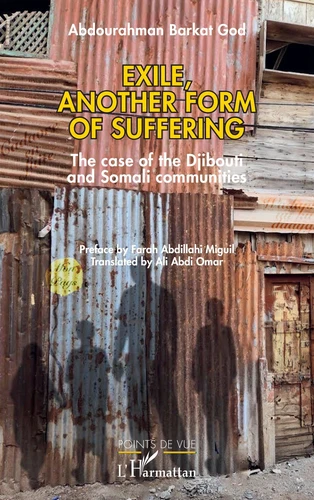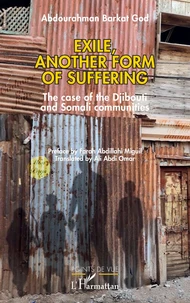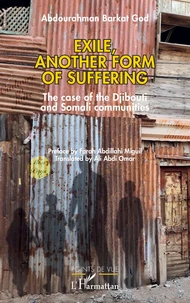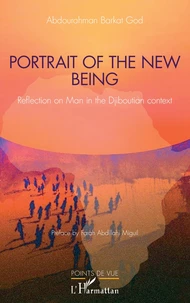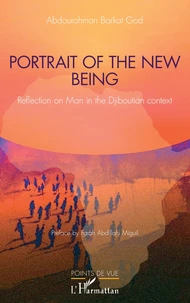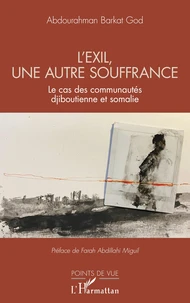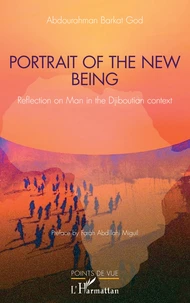Exile, another form of suffering. The case of the Djibouti and Somali communities
Par :Formats :
- Paiement en ligne :
- Livraison à domicile ou en point Mondial Relay indisponible
- Retrait Click and Collect en magasin gratuit
- Réservation en ligne avec paiement en magasin :
- Indisponible pour réserver et payer en magasin
- Nombre de pages162
- PrésentationBroché
- FormatGrand Format
- Poids0.195 kg
- Dimensions13,5 cm × 21,5 cm × 0,9 cm
- ISBN978-2-336-51487-1
- EAN9782336514871
- Date de parution13/03/2025
- CollectionPoints de vue
- ÉditeurL'Harmattan
- PréfacierFarah Abdillahi Miguil
- TraducteurOmar Ali Abdi
Résumé
This publication addresses the issue of exile through the lens of lived experiences : The space that is the catalyst for departure is the Republic of Djibouti and, more broadly, the Somali community in neighbouring countries. The destination, the object of often illusory hopes, is vast : Western countries (Europe, North America, Australia). The complexities of exile situations are multifaceted, contingent on various factors including access to the host country, age, gender, linguistic proficiency, and the ability (or inability) to assimilate oneself into the prevailing cultural milieu.
Additionally, the internal dynamics among migrants, the question of religion - which is often erroneously perceived by the host country - connections with the homeland, etc. are examined. Hence these questions : how can one navigate the intricate landscape of identities and cultures without losing oneself ? How to preserve, for the children, a part of the original identity ? The book does not seek to oversimplify the multitude of situations nor does it pass judgment - except on the initial circumstances that triggered the exile.
It acknowledges, in some cases, a mixed level of integration.
Additionally, the internal dynamics among migrants, the question of religion - which is often erroneously perceived by the host country - connections with the homeland, etc. are examined. Hence these questions : how can one navigate the intricate landscape of identities and cultures without losing oneself ? How to preserve, for the children, a part of the original identity ? The book does not seek to oversimplify the multitude of situations nor does it pass judgment - except on the initial circumstances that triggered the exile.
It acknowledges, in some cases, a mixed level of integration.
This publication addresses the issue of exile through the lens of lived experiences : The space that is the catalyst for departure is the Republic of Djibouti and, more broadly, the Somali community in neighbouring countries. The destination, the object of often illusory hopes, is vast : Western countries (Europe, North America, Australia). The complexities of exile situations are multifaceted, contingent on various factors including access to the host country, age, gender, linguistic proficiency, and the ability (or inability) to assimilate oneself into the prevailing cultural milieu.
Additionally, the internal dynamics among migrants, the question of religion - which is often erroneously perceived by the host country - connections with the homeland, etc. are examined. Hence these questions : how can one navigate the intricate landscape of identities and cultures without losing oneself ? How to preserve, for the children, a part of the original identity ? The book does not seek to oversimplify the multitude of situations nor does it pass judgment - except on the initial circumstances that triggered the exile.
It acknowledges, in some cases, a mixed level of integration.
Additionally, the internal dynamics among migrants, the question of religion - which is often erroneously perceived by the host country - connections with the homeland, etc. are examined. Hence these questions : how can one navigate the intricate landscape of identities and cultures without losing oneself ? How to preserve, for the children, a part of the original identity ? The book does not seek to oversimplify the multitude of situations nor does it pass judgment - except on the initial circumstances that triggered the exile.
It acknowledges, in some cases, a mixed level of integration.


